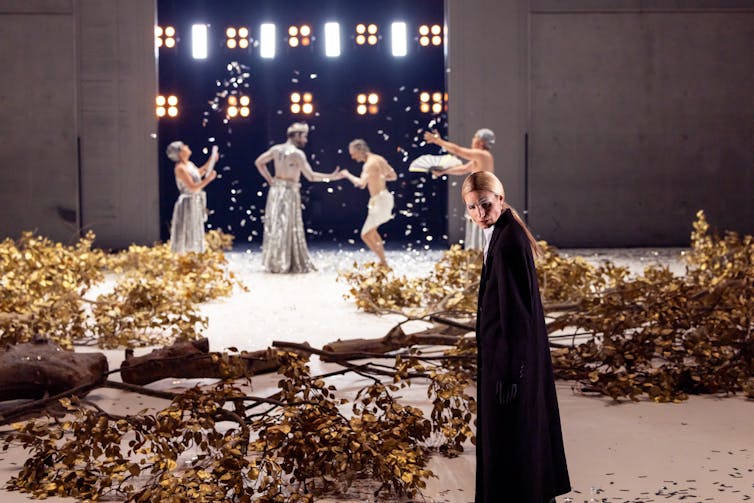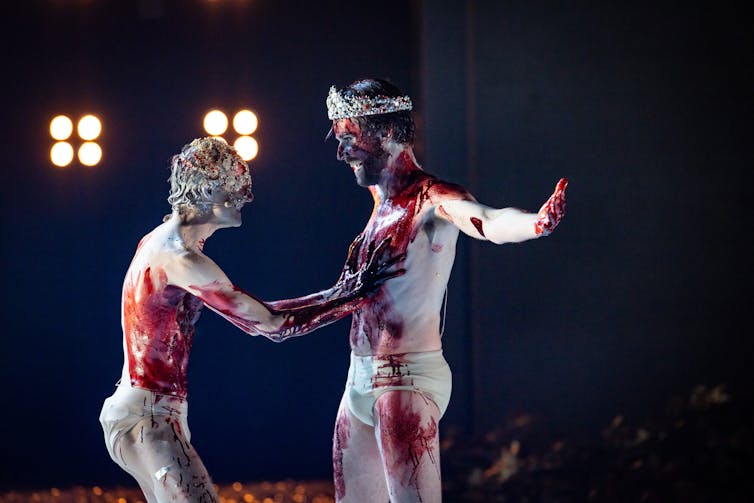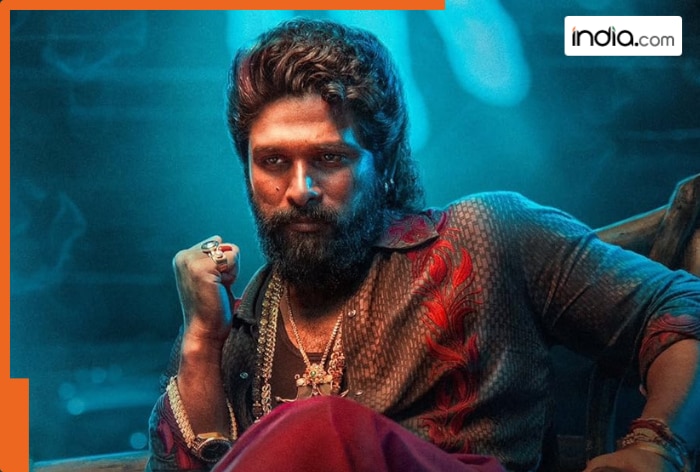Gilgamesh, a new opera from Opera Australia, Sydney Chamber Orchestra and Carriageworks, gives a visceral retelling of a story from a forgotten age, exploring ideas of love, tyranny and what it means to be human.
This new production reimagines the legend for 21st century audiences, while engaging cleverly with the epic’s timeless themes.
The young king, Gilgamesh (Jeremy Kleeman), starts out as a tyrant and goes on a journey to find the wisdom needed to become a just ruler.
Along the way, he meets his companion, Enkidu (a remarkable Mitchell Riley), a man born in the wilderness and civilised through two weeks of sex with the wise priestess Shamhat (Jessica O’Donoghue).
Together, Gilgamesh and Enkidu fight the monstrous forest guardian Humbaba (Daniel Szeisong Todd) and the mighty Bull of Heaven. They also unwisely provoke the beauteous goddess of love and war Ishtar (Jane Sheldon).
The heroes’ rash actions anger the gods, leading to Enkidu’s untimely death. Gilgamesh seeks eternal life and renewed youth, before finally returning home.
Read more:
Guide to the classics: the Epic of Gilgamesh
A rediscovered story
This production is the first English language opera of the Epic of Gilgamesh, a literary masterpiece from ancient Mesopotamia.
The story was first written down on clay tablets in the cuneiform script more than 4,000 years ago. Although Gilgamesh was famous in the ancient world, his story disappeared from cultural awareness along with the ability to read cuneiform around the 1st century CE.
Daniel Boud/Opera Australia, Sydney Chamber Opera, Carriageworks
In a feat of scholarly virtuosity, 19th century scholars deciphered the rediscovered cuneiform script, using a kind of Persian Rosetta Stone known as the Behistun monument.
In 1857, the Royal Asiatic Society held a kind of “cuneiform competition”, where scholars completed secret translations of a previously unseen inscription.
When their translations were found to be very similar, it was clear the secrets of the complex script had finally been unlocked.
Music and myth
In the 150 years since the Epic of Gilgamesh was rediscovered, the legend has inspired music spanning numerous genres, from hip hop, to Australian indie pop, to metal.
As with this new opera, many of these modern adaptations have focused on the loving relationship between the story’s two heroes, Gilgamesh and Enkidu. Their connection has been viewed as the world’s first bromance, or one of the oldest known love stories.
The opera leans into the transformative nature of heroes’ epic love: Enkidu’s wildman innocence is corrupted by Gilgamesh; Gilgamesh is emboldened by the presence of his lover.
There is much to admire in the approach to the text taken by composer Jack Symonds and librettist Louis Garrick.
At times, excerpts of text from an English translation of the epic are incorporated into the score. This use of ancient prose is particularly effective in the scene where Gilgamesh rudely rejects Ishtar’s marriage proposal; it would be difficult to create a more brutal polemic than that employed by Gilgamesh against the goddess in the ancient narrative.
At other times, new scenes and dialogue are crafted to draw deeper from the rich well of narrative ideas. This can be seen where Ishtar and Shamhat plan to civilise Enkidu (engineered by Gilgamesh in the original story), and a scene where Gilgamesh and Enkidu become lovers in the Cedar Forest.
The production
Kleeman gives a heroic turn as a man struggling to comprehend his mortality and his growing love for Enkidu.
Sheldon is divine as Ishtar the vengeful goddess of love, seamlessly blending the deity’s power and unpredictability.
As Utanapishti, the legendary flood survivor often compared with biblical Noah, Jessica O’Donoghue gives a haunting performance suited to one who has witnessed the destruction of most of humanity.

Daniel Boud/Opera Australia, Sydney Chamber Opera, Carriageworks
The set (design by Elizabeth Gadsby) uses as its centrepiece a Chinese elm tree with 1,000 gold fabric leaves, mirroring the combination of scale and simplicity seen in the narrative.
This reflects the creative team’s engagement with the epic’s ecological themes. The Cedar Forest is recognised in the original epic for its aesthetic and commercial value. Its destruction by the heroes is an act of sacrilege.
Directed by Kip Williams, Gilgamesh emphasises the violence of environmental destruction through the bloody death of the forest guardian Humbaba in a stomach-turning scene slippery with gore.

Daniel Boud/Opera Australia, Sydney Chamber Opera, Carriageworks
The love story between Gilgamesh and Enkidu is at the opera’s heart. Building on the intimate connection between the heroes in the ancient story, the two heroes sing songs of love together. Their vocal performances are matched with a dynamic physicality as they wrestle, embrace and cradle one another.
Those familiar with Gilgamesh will enjoy discovering where new creative directions have been taken in the opera. For those new to the story, the opera gives a vibrant introduction into the power and drama of one of the world’s most ancient masterpieces.
In the Babylonian legend, Gilgamesh finally abandons his quest for immortality. With this exciting new production of the epic, his ancient song of love and loss will continue to live on long into the future.
Gilgamesh,by Opera Australia, Sydney Chamber Orchestra and Carriageworks, is at Carriageworks, Sydney, until October 5.







